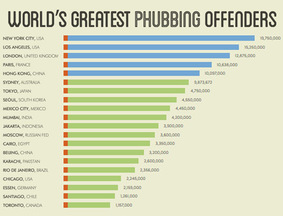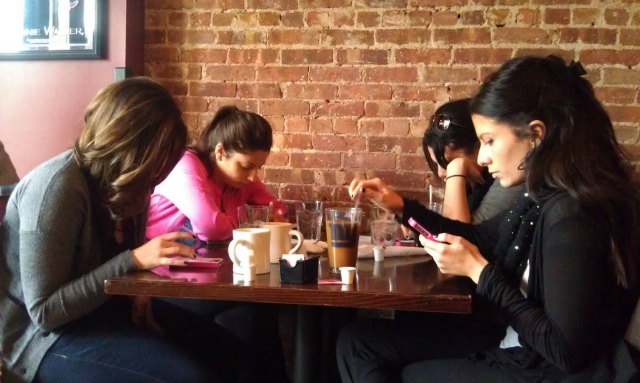 Sydney look out! We're pretty hectic phubbers!
Sydney look out! We're pretty hectic phubbers! As Martin Seligman (a leading exponent of Positive Psychology and Happiness) suggests, social cohesion is in part the realisation of three main factors: Companionship (hanging out together), Appreciation of the natural environment (being "in" as opposed to "watching" nature) and meeting our physical needs (eating, sleeping, being safe, extended adult cuddles.)
It's clear to me that a smart phone can emulate or simulate these factors, but cannot be them. The high tech copy may fool our brain for a time, but we are left not quite satisfied. Indeed, we can become quite unhappy if we live entirely connected in this way as we miss out on the very real physicality our evolved bodies crave.
Take Phubbing, a new term coined in association with Macquarie Dictionary, which is " a uniquely 21st century phenomenon of ignoring the person in front of you in favour of your phone." Who amongst us hasn't been guilty of this social etiquette failure? In fact, alongside "fone free feb", a modern etiquette campaign to stop phubbing has also sprung up. It's quite light-hearted and close-to-the-mark fun, but are there potentially deeper psychological concerns with smart phone overuse?
Professor Larry Rosen, an expert in the psychology of technology, writes interestingly in Psychology Today of phantom pocket vibrations. Have you ever had those? It's when you "feel" your phone vibrate when it hasn't. It may be that part of your leg where your phone normally rests, or you feel your handbag or desk vibrate when in fact it has not. Professor Rosen links the phenomena to the neural pathways established to the anxiety areas of our brain caused by the (real) vibrations of our phone. The phone ringing triggers such a heightened response, that, when feeling anxious about our lives or social contact, the information can actually flow in reverse, making it feel like our phone has vibrated.
His point is that if we are interpreting random neurological signals as smart phone notifications, then we must retrain our selves as these anxiety induced and inducing loops are unhealthy, and will in fact prevent us from being able to engage in useful connectedness in the "real" world. It may even prevent us from simple tasks such as resting, or enjoying simple pleasures such as walking or noticing a sunset.
Being present in your life is a prerequisite for a happy life.
Finally, The Huffington Post has a handy list of 19 signs to indicate you're using your phone too frequently, right here. They are again a little light-hearted, but the point is abundantly clear. I suggest, especially if you're reading this on your phone, that you put it down, breathe deeply, and spend a few moments just looking around, and engaging with what you see, smell, hear, and feel.
Do you spend too much time "connected?" How has this impacted on you? Leave a comment and vote in the poll below to share your experiences.
References
- http://fonefreefeb.com/
- http://www.psychologytoday.com/blog/rewired-the-psychology-technology/201305/phantom-pocket-vibration-syndrome
- Rosen, Larry D. (2010) Rewired: Understanding the iGeneration and the way they learn. Palgrave Macmillan, New York.
- Seligman, Martin E.P. (2002). Authentic Happiness: Using the New Positive Psychology to Realize Your Potential for Lasting Fulfillment. New York, NY: Free Press.
- http://stopphubbing.com/


 RSS Feed
RSS Feed